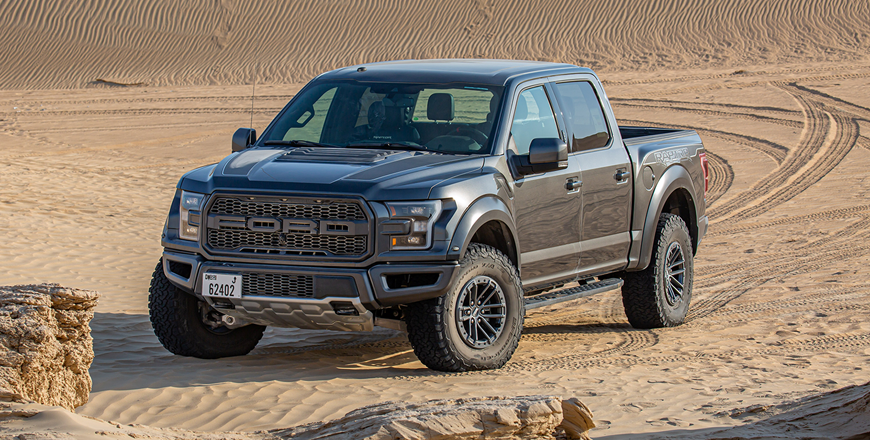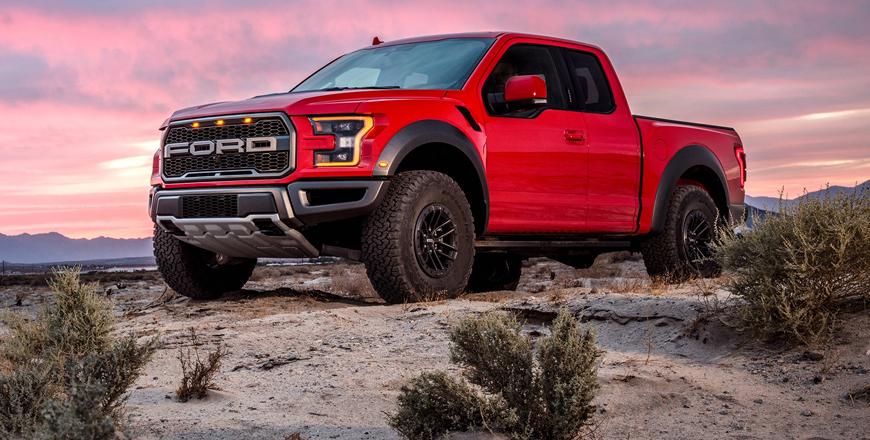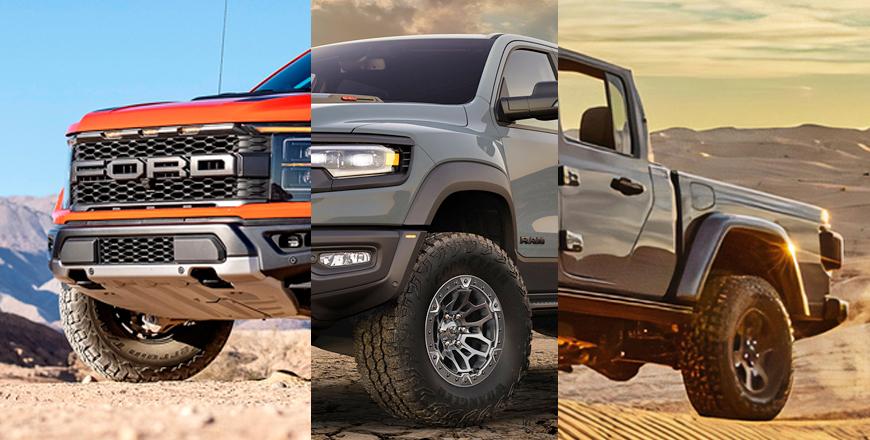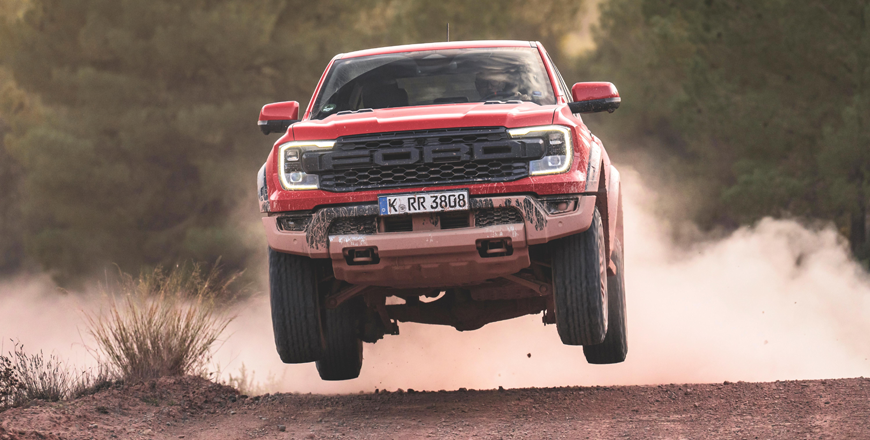You are here
Ford F150 Raptor: Off-the-shelf convenience, quick off-road capability
By Ghaith Madadha - Sep 12,2022 - Last updated at Sep 12,2022

Photos courtesy of Ford
A modern motoring icon since 2009, the Ford F150 Raptor is far more than mere trim level, but is a near race-ready sand dune hopping extreme machine that sacrifices none of the standard F150’s convenience, equipment or spacious comfort, especially in SuperCrew specification.
Arriving in 2017 and updated in 2019, the second generation radically introduced a more powerful down-sized engine and lighter aluminium body. Currently being replaced by an all-new incarnation across markets, the outgoing Raptor nevertheless still holds up brilliantly, and is still listed by Ford in Jordan.
Dramatically distinguished
Distinguished from regular F150s by its aggressive wide body and bulging wheel-arches that allow longer travel for its chunky off-road tyre-clad wheels, the Raptor is also identified by its grille’s honeycomb mesh, dark grey surround and big font “FORD” lettering that replaces the brand’s traditional blue oval. Ruggedly redesigned, its bumper is higher set for better ground clearance, and features bigger side intakes and a lower skid plate. A stealthier take on the F150, the Raptor replaces almost all chrome with dark detailing.
Sitting under its bulging and vented bonnet, and behind its huge snouty grille and contrastingly deep-set dramatic headlights, the Raptor is powered by a high output version of the F150’s twin-turbocharged, direct injection 3.5-litre V6 Ecoboost engine. Brutally quick but sophisticated, the second generation Raptor is 227kg lighter, and more muscular, than its larger naturally-aspirated 6.2-litre V8 predecessor. Meanwhile, a more responsive 10- rather than 6-speed automatic gearbox better utilises the Raptor’s extensive output for better performance, versatility, refinement and efficiency.
Action and traction
A big beast that belies its enormity and 2,584kg mass, the Raptor is quick from standstill, with tenacious four-wheel-drive traction and responsively quick turbo spooling allowing enabling it to rocket through 0-100km/h in an estimated 5.5-seconds or less. Producing 450BHP at 5,000rpm and 510lb/ft torque at 3,500rpm, the Raptor is eager at low revs and deeply muscular in mid-range, with an abundant and broad torque range. That said, it also pulls urgently and viciously to redline, and can attain an estimated electronically-governed 172km/h maximum.
Driven in either rear- or four-wheel-drive “auto” modes for efficient on-road driving, with the latter providing front traction, as needed, the Raptor features full-time four-wheel-drive for tough low traction off-road terrain, and low gear ratios for extreme conditions. A locking rear differential keeps rear wheels moving together for low traction grip and on-road agility. Meanwhile, an optional Torsen centre differential allocates power between front and rear as necessary, and a low speed selective braking Trail Control system can send power to individual wheels.
Desert developed
Developed for demanding and fast Baja-style desert driving, the Raptor features long suspension travel to easily absorb ruts and bumps, and to maintain wheel contact with the ground for effective traction in extreme conditions. It meanwhile rides on race-derived Fox Shox 3.0 dampers, with an internal valve bypass system that alternately adjusts for stiff body control and forgiving comfort, and to prevent bottoming out when launched into the air. Massive and tough 315/70R17 tyres meanwhile feature high sidewalls and wide tread spacing.
Despite off-road oriented tyres, the Raptor is probably the sportiest driving and most comfortable F150 variant, with its wider track, long wheel travel, coil springs, Fox dampers and limited slip rear differential providing a combination of unexpectedly eager cornering agility and excellent body control for a heavy high-riding truck, and comfortably supple ride compliance. With generous off-road ground clearance and angles, it is also reassuringly stable at speed, while its rear is exceptionally settled and buttoned down for a live rear axle truck.
Long on luxury
If not s nimble or responsive shifting weight at the rear as the shorter — but still long — SuperCab version, the yet longer 5,890mm full four-door Raptor SuperCrew is nevertheless tidy and eager turning into corners. With longer wheelbase and wide track the SuperCrew does, however, deliver great road-holding. Firm and heavy in “sport” mode but lighter in comfort-oriented modes, the Raptor’s electric-powered steering offers little on-centre feel and is not too nuanced, given its huge tyres, but is direct and weighs up well through corners.
As comfortable, convenient and well-equipped with safety, mod-con and infotainment features as other garden variety F150s variants, the Raptor similarly includes parking aids and cameras to help manoeuvre its outsized dimensions in busy city conditions. With a distinctly sportier ambiance, the Raptor’s cabin is, however, awash with carbon-fibre accents, Alcantara upholstering and trim, and features an off-road information monitor and superbly supportive front Recaro sports seats. Generously roomy every which way, the four-door SuperCrew version provides almost limo-like rear legroom and easy cabin access.
TECHNICAL SPECIFICATIONS
- Engine: 3.5-litre, all-aluminium, twin-turbo, in-line V6-cylinders
- Bore x stroke: 92.5 x 86.7mm
- Compression ratio: 10:1
- Valve-train: 24-valve, DOHC, variable valve timing
- Gearbox: 10-speed automatic, four-wheel-drive
- Drive-line: 2.64:1 low ratio transfer case, electronic locking rear differential, optional centre Torsen differential
- Gear ratios: 1st 4.69; 2nd 2.98; 3rd 2.14; 4th 1.76; 5th 1.52; 6th 1.27; 7th 1.0; 8th 0.85; 9th 0.69; 10th 0.63; R 4.86
- Final drive ratio: 4.1:1
- Power, BHP (PS) [kW]: 450 (456) [335.5] @5,000rpm
- Specific power: 179.5BHP/litre
- Power-to-weight: 174.1BHP/tonne
- Torque, lb/ft (Nm): 510 (691.5) @3,500rpm
- Specific torque: 197.6Nm/litre
- Torque-to-weight: 267.6Nm/tonne
- 0-100km/h: under 5.5-seconds (estimate)
- Top speed: 172km/h (estimated, electronically governed)
- Approach/break-over/departure angles: 30.2°/22.8°/23°
- Cargo bed height, length, width: 543, 1,705, 1,285-1,656mm
- Fuel capacity: 136-litres
- Steering: Electric-assisted rack & pinion
- Suspension, F/R: Double wishbones, coil springs/live axle, leaf springs
- Dampers: Gas-pressurised, electronically-controlled, continuously variable Fox 3.0 Racing Shox
- Brakes, F/R: Ventilated discs, 350 x 34mm/drum, 336 x 24mm
- Brake calipers, F/R: Twin/single
- Tyres: 315/70R17
Related Articles
As close as a regular production vehicle gets to being an off-the-shelf off-road racer, the Ford F150 Raptor has in the decade since its fir
Comfortable, capable and convenient, large American-built pick-up trucks have become popular in Jordanian during the last 20 years.
Perhaps the most practical and versatile of automobile segments, the double cab 4x4 mid-size pick-up truck is renowned for its rugged durabi














